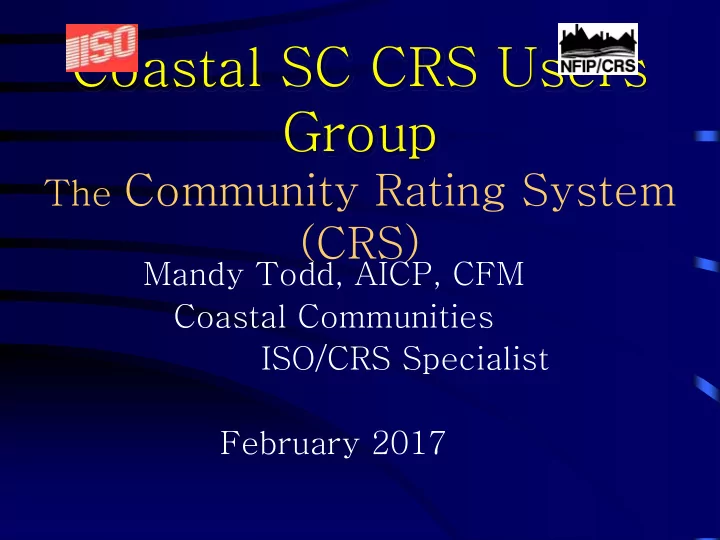

Coastal SC CRS Users Group The Community Rating System (CRS) Mandy Todd, AICP, CFM Coastal Communities ISO/CRS Specialist February 2017
CRS Updates
Upcoming CRS Cycles Folly Beach City of Beaufort Beaufort County Berkeley County Charleston County Edisto Beach North Myrtle Beach City of Georgetown Myrtle Beach North Charleston Seabrook Island
Program Data Table 1. Area of SFHA (acres) – Delete Federal Lands – Delete Large Bodies of Water 2. Number of Buildings in SFHA – Insurable Structures – No pools, garages, accessory structures PDT starts with first cycle under 2013/2017 Manual and is updated at following recertifications
310 Elevation Certificates CRS Credit Criteria: 1. Maintain completed “Finished Construction” ECs: − for all new buildings − and substantial improvements/substantial damage − in the SFHA 2. Review for correctness: See Correction Checklist (Coordinator’s Manual pages 310-7 & 8) 3. Make copies of ECs available to public
ELEVATION CERTIFICATES Activity 310 Cycle Visit – list of permits for previous 5 years Random selection of 30 ECs to submit Annual Recertification – copies of all ECs Include v-zone certifications and Engineered Flood Opening Certifications
310 Elevation Certificates CRS Credit Criteria: At least 90% of the community’s certificates must be correct. If less than 90% of the certificates pass the community must correct them to stay in the CRS. The credit for EC is based on the review of certificates submitted for the verification visit. It will not change after the community makes the needed corrections.
310 Elevation Certificates
320 Map Information Service
320 Map Information Service Example of required publicity Figure 320-1 A sample log for a map information service. (Page 320-5)
320 Map Information Service
330 – Outreach Projects Messages Clearly state what the audience should do “Get a floodplain permit from…” “Buy flood insurance contents coverage” “Turn Around Don’t Drown” “Keep debris and trash out of streams and ditches” “Your property is subject to flooding. Check with the City to find out your flood zone” “No pollutants down the storm drains; they drain to the bay”
330 Outreach Projects Without PPI Outreach Projects – OP – Distributed Every Year Max credit 200 points 6 Topics Informational Material – 1 pt per • Know your Flood Hazard topic • Insure your property (Min. 1 project) • Brochures at permit office • Protect people from hazard • Handouts • Protect property from hazard General Outreach – 2 pts per • Build responsibly topic • Protect natural floodplain functions • Presentations to civic groups • Newspaper inserts • Signs – “Don’t dump”
330 Outreach Projects
330 Outreach Projects Informational Outreach Project – 1 point per topic 25 Brochures – minimum 25 points Brochure Rack at 5 locations (max) 25 x 5 = 125 points
330 Outreach Projects Without PPI Outreach Projects – OP – Distributed Every Year Max credit 200 points 6 Topics Targeted Outreach - 6 pts per topic • must reach entire targeted audience • Know your Flood Hazard • must clearly explain that the recipient • Insure your property (min 1 Project) is receiving the information because • Protect people from hazard they are a part of the targeted • Protect property from hazard audience • Build responsibly • Protect natural floodplain functions Targeted Audiences SFHS Residents Rep Loss Area Residents Residents protected by Levee Residents protect by upstream dam Residents affected by a Special Flood-Related Hazard
330 Outreach Projects FRP – Flood Response Preparations – max 50 points EXAMPLES Media kit with information for reporters Radio public service announcements Door hangers for flooded homes Handouts on grant programs Handouts on permit procedures, site clean-up, etc. SUBMITTAL • Copy of masters for handouts, news releases, projects • Written procedures that explain how projects are disseminated • Documentation that materials are reviewed annually to determine if they are still current and appropriate
350 Flood Protection Information LIB – 10 Listed Library Books LPD – 10 Locally Pertinent Documents Ordinances Hazard Mitigation Plan Hurricane Information Flood Maps FIS
420 Open Space Preservation DOCUMENTATION • Area of SFHA • Map showing open space parcels in SFHA • Master list of OS parcels with a description of the parcel and the acreage in SFHA • Aerial views of the 10 largest properties
420 Open Space Preservation
420 Open Space Preservation
420 Open Space Preservation
420 Open Space Preservation
420 Open Space Preservation
430 Higher Regulatory Standards Updates when adopting Consider Ordinance New flood maps
501 Repetitive Loss Areas Repetitive Loss Worksheet a. Description of the cause(s) of repetitive flooding b. Map identifying repetitive loss AREA(S) c. Address list of all properties in the RL area(s) with insurable buildings on them d. The number of buildings in the repetitive loss area(s)
501 Repetitive Loss Areas Repetitive Loss Outreach Project e. Annual outreach project that (a) Tells recipient of the flood hazard (b) Explains property protection measures (c) Covers sources of financial assistance (d) Includes basic facts about flood insurance Send to all properties in the rep loss AREAS (HINT – include all 6 topics for max credit for targeted outreach – 36 points)
610 Flood Warning To receive any 610 credit the community must receive some credit for FTR - Flood Treat Recognition, EWD - Early Warning Dissemination, FRO - Flood Response Operations and CFP - Critical Facilities Planning •The community must have a description of its flood hazard (HMP) •There must be a flood inundation map – 3 levels (SLOSH) •There must be an adopted flood warning and response plan •There must be one or more outreach projects on the warning and safety precautions •There must be an annual exercise of the plan with a lessons-learned report (AAR) •Must provide a list of critical facilities operational during a flood event with contact information
610 Flood Warning Prerequisite: Outreach to residents and businesses on how they will be warned and safety measures they should take • Outreach sent to everyone in community • Outreach sent to everyone in SFHA • PPI – designated appropriate approach
QUESTIONS?
Recommend
More recommend